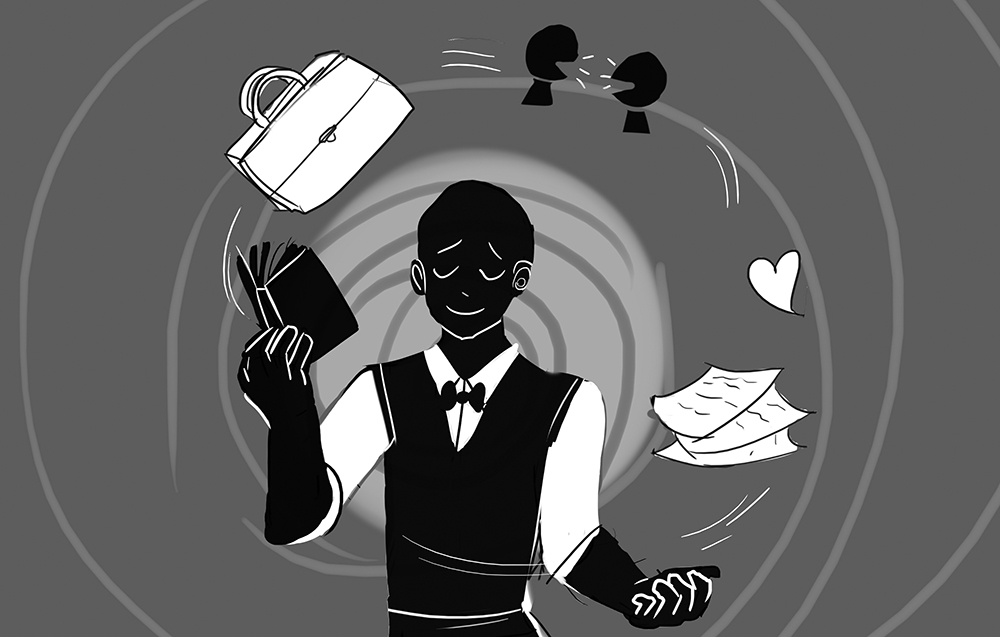Umaimah Adan | Contributor
Featured illustration: It’s important for students to de-stress before things become overwhelming. | Jasmine Wiradharma
According to the Canadian Labour Code, the standard workweek is 40 hours. However, nearly two thirds of citizens work overtime. Long hours at work, coupled with endless personal commitments, make for a very busy society.
This state of being busy extends to various groups, from those in the workforce to students. Students find themselves with never-ending assignments, exams and presentations. On top of academic commitments, extracurriculars, internships and volunteer positions leave many scrambling to keep up with their full calendars. Variations of the common proverb “the devil finds work for idle hands” are heard by many. Perhaps that fear is what propels people to constantly be in motion.
Despite the fact that being busy is a reality for many, it is interesting to note the pride with which one may announce their “various states of busy.” Speaking of one’s endless tasks is almost reflexive in casual conversation. People inject their “busy-ness” into daily conversation as a badge of honour. I’m guilty of engaging in plenty of back and forth recitations of to-do lists with my peers. Why is it we feel oddly victorious when we appear busier than others? Maybe we can blame this fixation on the societal importance of productivity.
The driving force behind a capitalist economy is generating, and the tool used to produce this outcome is productivity. Therefore, productive members of a capitalist society are those who spend their time and efforts generating as much profit as possible. This can explain why we are so fixated on being busy. Our jam-packed schedules and inability to relax are seen as a good thing. We are considered inherently more valuable members of society based on how much of ourselves we give to our work. Karl Marx’s theory of alienation describes the way a worker loses himself in the work he produces. Similarly, many of us are so busy working that we are unable to engage in activities we truly enjoy. This enormous lack of balance is a result of a society that places economic benefit above the overall well-being of its members.
Many people are now choosing to abandon their busy lifestyles for a more balanced alternative. Arianna Huffington, co-founder and editor-in-chief of The Huffington Post, discusses the importance of a balanced life in her book, Thrive, The Third Metric to Redefining Success and Creating a Life of Well-being, Wisdom, and Wonder. She uses personal experiences to highlight the damage that can be caused both physically and mentally by overworking yourself. She suggests that in the pursuit of money, we are leaving behind what truly matters. Huffington’s book also includes a 10 step guide for creating a better life. The list includes engaging in hobbies to improve well-being and getting more sleep.
Whole societies are choosing to reject the status quo. In an effort to improve work-life balance and the overall well-being of its citizens, Sweden introduced an experiment in which employees work six hour days instead of the typical eight hours. An article by The New York Times spotlights a senior home in Sweden that took part in this experiment. After only a year under the new system, an audit reported higher attendance, productivity and health of employees. Contrary to mainstream thinking, one’s ability to be productive may hinge on their well-being.
The efforts to lessen the burden of the busy have their roots in science. Dr. Herbert Benson of the Benson-Henry Institute introduced the “relaxation response.” This is the body’s ability to counteract stress genes, thus lowering stress levels. This response is triggered by activities such as meditation, deep breathing or just plain relaxing. Therefore doing “nothing” actually is doing something.
Consider the nature of your regular routine and the many roles you take on over the course of a day. Instead of succumbing to your desire to fill every moment of every day, try taking the time to be still, mindful and not so busy. There are a number of ways that students at York can unwind and move away from the busy schedules. College lounges offer relaxing spaces with couches and a number of different games and activities to enjoy, including ping pong and foosball. The YFS also offers weekly yoga classes. Students can also head over to Tait McKenzie, the campus gym, for a quick workout.




